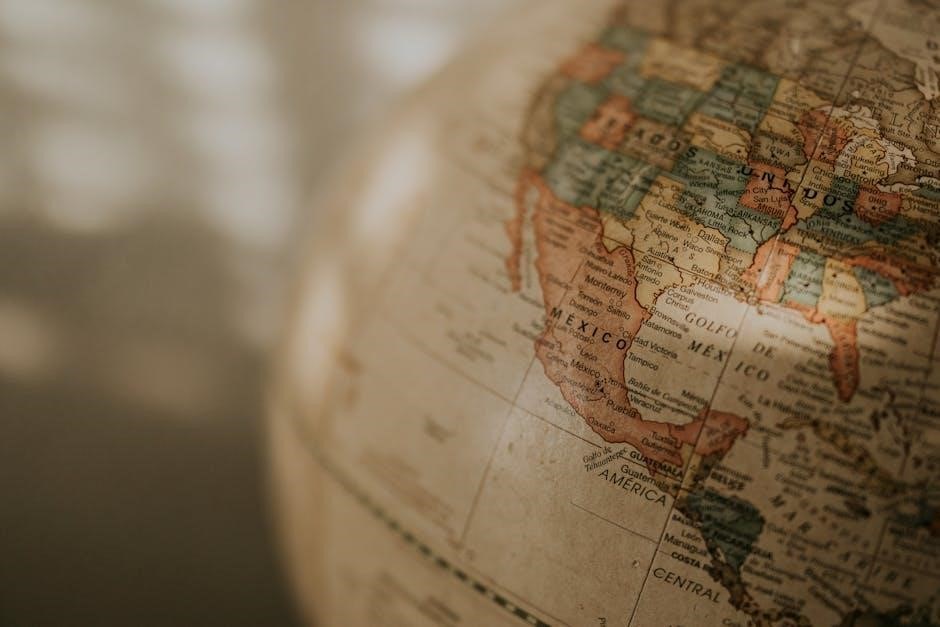Unit 6 explores the complexities of imperialism from 1750 to 1900, examining its causes, justifications, and far-reaching consequences on global power structures and cultural identities.
Overview of Imperialism in the Modern World
Imperialism in the modern world, spanning from 1750 to 1900, was driven by economic, political, and social factors. European nations sought raw materials and markets to fuel industrialization, while ideologies like Social Darwinism and the “civilizing mission” justified colonization. This period saw the rise of global power struggles, with European empires competing for dominance. Imperialism reshaped societies, leading to cultural exchanges and hybridity, but also caused exploitation and resistance. Understanding these dynamics is crucial for analyzing the legacy of imperialism in shaping the modern world.
Key Themes and Concepts in Unit 6
Unit 6 delves into the core themes of imperialism, including economic motivations like raw materials and markets, political drivers such as nationalism, and social ideologies like the “civilizing mission.” Key concepts include Social Darwinism, cultural exchange, and resistance movements. The unit also examines the exploitation of colonized regions and the impact on indigenous populations. These themes highlight the complex interplay of power, culture, and economics that defined imperialism during this period.
Historical Context: 1750-1900
The period from 1750 to 1900 witnessed significant transformations driven by industrialization and European expansion. This era saw the rise of imperialism, with European powers colonizing vast regions in Africa and Asia. The decline of older empires, such as the Qing dynasty in China and the Ottoman Empire, created opportunities for new colonial powers. Industrialization fueled the demand for raw materials, while technological advancements facilitated global domination. This timeframe sets the stage for understanding the motivations and consequences of imperialism during this pivotal century.

Causes and Motivations for Imperialism
Imperialism was driven by economic needs, political ambitions, and cultural beliefs, including the pursuit of raw materials, markets, and the ideology of the “civilizing mission.”
Economic Factors: Raw Materials and Markets
European nations sought raw materials like rubber, cotton, and minerals to fuel industrial growth and satisfy domestic demands. Colonization provided access to new markets, enabling nations to expand trade and secure economic dominance. The exploitation of colonized regions ensured cheap labor and resources, strengthening European economies. This economic drive was central to imperialism, as it promised wealth and global influence, often justifying conquest as necessary for national progress and survival in an increasingly competitive world economy.
Political Motivations: Nationalism and Competition
Nationalism played a significant role in imperialism, as nations sought to expand their influence and establish dominance. Political competition among European powers drove the scramble for colonies, with countries aiming to outpace rivals and secure strategic territories. The belief in national superiority fueled imperial ambitions, while the desire for global power and prestige motivated states to assert control over weaker regions. This political rivalry shaped alliances, conflicts, and the partitioning of the world, reflecting the era’s intense geopolitical tensions and the pursuit of empire-building.
Social and Cultural Factors: Civilizing Mission
The “civilizing mission” was a central ideology justifying imperialism, claiming that European powers had a moral duty to uplift “backward” societies. This rationale emphasized spreading Christianity, modern technology, and Western values to colonized regions. However, it often masked exploitation, as local cultures were suppressed and replaced with European norms. The belief in cultural superiority legitimized colonial rule, framing it as a noble endeavor rather than a form of oppression. This mindset deeply influenced both policy and public perception during the imperialist era, shaping interactions between colonizers and indigenous populations.

Justifications for Imperialism
Imperialism was justified through ideologies like Social Darwinism and religious beliefs, promoting the idea of racial superiority and a moral duty to “civilize” others.
Social Darwinism and Racial Ideologies
Social Darwinism applied evolutionary concepts to societies, justifying imperialism through ideas of racial hierarchy and survival of the fittest. Europeans viewed themselves as superior, believing they had a duty to “civilize” other races. This ideology legitimized colonial exploitation, framing it as a natural process. Racial ideologies reinforced these beliefs, portraying colonized peoples as inferior and in need of guidance. Such concepts were deeply intertwined with nationalism, further fueling imperialist ambitions and the subjugation of non-European societies during the 19th century.
Religious and Moral Justifications

Religious and moral justifications for imperialism often centered on the idea of a “civilizing mission,” where European powers claimed a duty to spread Christianity and enlightenment. Missionaries played a key role in legitimizing colonial expansion, presenting it as a moral imperative to save “heathen” societies. Additionally, the belief in racial and cultural superiority was framed as a divine responsibility, further entrenching imperialist ideologies. These justifications were deeply intertwined with nationalist sentiments, reinforcing the notion that imperialism was not only economically beneficial but also morally righteous and divinely ordained.
Nationalism and the Concept of the “Civilizing Mission”
Nationalism played a significant role in justifying imperialism, as European powers often framed their expansion as a duty to spread their culture and values. The “civilizing mission” ideology posited that colonizers had a moral obligation to uplift “backward” societies, imposing their own institutions, languages, and beliefs. This rhetoric masked economic and political motives, portraying imperialism as a noble endeavor. Competition among European nations further fueled these claims, as each sought to assert its superiority and influence globally, often leading to conflict and exploitation under the guise of progress.

Economic Impact of Imperialism
Imperialism reshaped global economies, driving the exploitation of raw materials and markets while creating trade dependencies that enriched European nations but perpetuated inequality in colonized regions.
Effects on European Economies
Imperialism significantly bolstered European economies by providing access to raw materials and expanding markets for manufactured goods. This fueled industrial growth and technological advancements. Wealth from colonies enriched European nations, enabling investment in infrastructure and public services. However, this prosperity came at the cost of economic dependency on colonized regions. The exploitation of resources led to uneven wealth distribution, benefiting elites while neglecting laborers. European economies became increasingly intertwined with global trade, solidifying their dominance in the world market during this period.
Exploitation of Colonized Regions
Colonized regions were heavily exploited for their natural resources, such as cotton, rubber, and minerals, to fuel European industries and economies. Local labor forces were often coerced into working under harsh conditions, with little to no compensation. This extraction of resources and labor led to the depletion of local economies and environments, perpetuating underdevelopment in colonized areas.
Global Trade Patterns and Economic Dependency
Imperialism significantly altered global trade patterns, as European powers exploited colonized regions for raw materials to fuel their industries. Colonies became dependent on European markets, leading to economic dependency. This system enriched industrialized nations while stifling local economies, creating a cycle of underdevelopment. Global trade patterns were reshaped to serve imperial interests, often at the expense of indigenous industries and self-sufficiency in colonized areas.

Social and Cultural Changes
Imperialism brought profound social and cultural changes, including cultural exchange, hybridity, and shifts in gender roles. Indigenous traditions often blended with European influences, reshaping identities globally.
Impact on Indigenous Populations
Indigenous populations faced displacement, marginalization, and cultural erasure due to imperialism. European powers imposed their languages, religions, and customs, often suppressing native traditions. Social hierarchies were disrupted, and local leaders lost authority. Many indigenous groups experienced significant population decline due to disease, violence, and forced labor. Despite these challenges, some communities resisted cultural assimilation, preserving their identities. The legacy of these impacts remains evident in modern-day struggles for indigenous rights and self-determination, highlighting the profound and lasting effects of imperial rule.
Changes in Gender Roles and Social Structures
Imperialism significantly altered gender roles and social structures. European colonizers often imposed rigid gender norms, disrupting indigenous systems where roles might have been more fluid. Women in colonized societies frequently faced marginalization, as their contributions to agriculture and trade were undervalued. The introduction of new legal and religious frameworks sometimes restricted women’s rights, reinforcing patriarchal systems. However, imperialism also created spaces for resistance, with some women challenging these changes and advocating for their communities’ rights, though often under harsh conditions. These shifts laid the groundwork for ongoing struggles for gender equality in post-colonial societies.
Cultural Exchange and Hybridity
Imperialism facilitated cultural exchange, blending traditions, languages, and beliefs between colonizers and colonized peoples. While often unequal, these interactions led to hybrid cultural practices. European languages and religions spread widely, while indigenous cultures influenced local adaptations of colonial practices. This exchange reshaped identities and created new cultural forms, though often under the shadow of power imbalances. Hybridity became a defining feature of post-colonial societies, reflecting both the richness of cultural fusion and the complexities of historical power dynamics that continue to resonate today.

Political Consequences of Imperialism
Imperialism reshaped global politics, fostering colonial administration systems, sparking resistance, and fueling nationalist movements. It also intensified international rivalries, shaping alliances and future conflicts.
Colonial Administration and Resistance
Colonial powers established various administrative systems to control their territories, often combining indirect rule through local leaders with direct governance. This led to resistance movements, as indigenous populations opposed foreign domination. Rebellions varied in scale, from localized uprisings to large-scale revolts, often driven by cultural, economic, and political grievances. Over time, these resistance efforts contributed to the rise of nationalist movements, which sought independence and self-determination, laying the groundwork for decolonization in the 20th century.
Rise of Nationalist Movements
Nationalist movements emerged as a response to colonial rule, fueled by a growing sense of identity and resistance among colonized peoples. These movements often drew on Enlightenment ideas of self-determination and sovereignty. Local leaders and intellectuals played a key role in organizing and mobilizing populations, emphasizing cultural and historical ties to challenge foreign domination. The rise of nationalism also intersected with anti-colonial movements, leading to demands for independence and shaping the trajectory of decolonization in the 20th century.
Global Power Struggles and Alliances
Global power struggles during the imperialist era were shaped by competition for colonies, resources, and strategic advantage. European nations formed alliances to maintain a balance of power, while colonial rivalries exacerbated tensions. The scramble for Africa and Asia intensified these conflicts, as nations sought to expand their influence. Meanwhile, emerging powers like the United States and Japan challenged European dominance, reshaping global alliances and setting the stage for future conflicts. These power dynamics deeply influenced the political and economic landscapes of both colonizers and colonized regions.

Responses to Imperialism
Colonized peoples and global critics challenged imperialism through resistance, rebellions, and calls for reform, inspiring movements that sought to dismantle oppressive systems and promote self-determination.
Local Resistance and Rebellion
Colonized populations often resisted imperial rule through uprisings and rebellions, such as the Indian Rebellion of 1857 and the Philippine Revolution. These movements, though frequently suppressed, demonstrated the resilience of indigenous cultures and political aspirations. Guerrilla warfare and armed resistance became common tactics. Leaders like Emilio Aguinaldo and Queen Lakshmibai symbolized the struggle for independence. Although many rebellions failed to achieve immediate freedom, they laid the groundwork for future nationalist movements and highlighted the moral and ethical flaws of imperial domination.
International Opposition and Criticism
International opposition to imperialism grew as critics highlighted its exploitative nature and moral contradictions. Writers like J.A. Hobson exposed economic exploitation, while E.D. Morel condemned colonial abuses. Organizations such as the Abolition Society in Britain advocated for human rights and opposed forced labor. Criticism also emerged from socialist and liberal intellectuals, who argued that imperialism undermined global justice and equality. Despite these efforts, imperialism persisted, though such critiques laid the groundwork for future anti-colonial movements and reforms, challenging the legitimacy of imperial powers worldwide.
Reforms and Decolonization Movements
Reforms and decolonization movements emerged as responses to imperialism, seeking to address its injustices. Post-WWII, movements like Gandhi’s nonviolent resistance in India gained momentum, inspiring similar efforts in Africa and Asia. International pressure and the rise of the U.S. and USSR as global powers accelerated decolonization. Reforms aimed to grant colonies autonomy, leading to independence for many nations by the mid-20th century. These movements reshaped global politics, fostering a shift toward self-determination and challenging colonial legacies, with lasting impacts on modern nation-building and international relations.

Legacy of Imperialism
Imperialism’s legacy includes enduring economic structures, cultural identities, and social inequalities. Its impact shapes modern global relations, influencing political stability and economic disparities between former colonies and colonizers.
Long-term Effects on Global Power Structures
Imperialism reshaped global power dynamics, creating lasting hierarchies between colonizers and colonies. European nations gained dominance, while colonized regions faced economic dependency and political instability. The exploitation of resources and labor reinforced wealth disparities, perpetuating a global divide. These structures influenced modern international relations, with former colonies often struggling to achieve economic and political parity. The legacy of imperialism continues to affect global governance, trade systems, and cultural identities, highlighting its profound and enduring impact on world power structures.
Modern-day Implications of Imperialism
Imperialism’s legacy is evident in modern global inequalities, cultural identities, and geopolitical tensions. Former colonies often face economic disparities, while wealthier nations maintain influence through neo-colonial practices. Cultural exchanges, though enriching, sometimes mask historical exploitation. Contemporary issues like migration, resource distribution, and international relations are deeply rooted in imperial histories. Understanding these connections is crucial for addressing ongoing global challenges and fostering a more equitable world order, highlighting imperialism’s enduring impact on modern society and international dynamics.
Critiques and Reflections on Imperialism
Imperialism is widely criticized for its exploitative nature, fostering inequality and undermining local cultures. Critics argue that the “civilizing mission” was a veil for economic and political domination. Social Darwinism and racial ideologies justified oppression, perpetuating systemic injustices. Reflections on imperialism highlight the need for accountability, emphasizing the long-term consequences of resource extraction and cultural suppression. These critiques underscore the importance of understanding imperialism’s ethical dimensions and its role in shaping modern global disparities, urging a nuanced approach to historical and contemporary power dynamics.

Study Tips and Review Strategies
Use the Amsco book and online resources like Quizlet for flashcards. Focus on essential questions and participate in class discussions to deepen understanding of Unit 6 concepts.
Essential Questions to Guide Study
What were the primary motivations for imperialism, and how did they vary across European nations? How did imperialism impact global power structures and cultural identities? What role did Social Darwinism and nationalism play in justifying imperialist actions? How did colonization affect indigenous populations economically and socially? What were the key differences between British, French, and Belgian colonial policies? How did resistance movements emerge, and what were their outcomes? Understanding these questions will help guide your study of Unit 6 and prepare you for exam questions.
Recommended Resources and Materials
Key resources for studying Unit 6 include the AP World History textbook, focusing on chapters 31 and 32, and the Amsco book for targeted review. Utilize online platforms like Quizlet for flashcards on terms such as Social Darwinism and nationalism. Kahoot provides interactive practice tests to reinforce concepts. Additionally, the AP World History Study Guide and review videos from Heimlers History offer comprehensive overviews. Ensure to review the essential questions and chapter notes to prepare effectively for exams and assignments.



